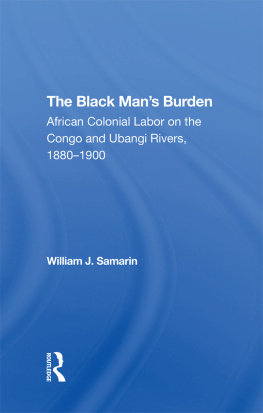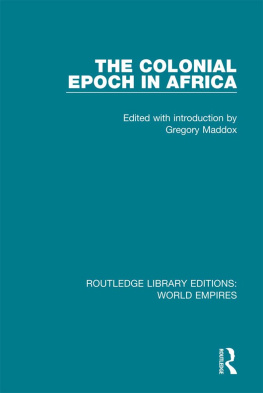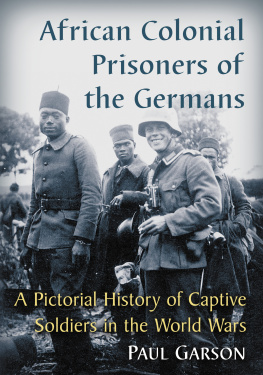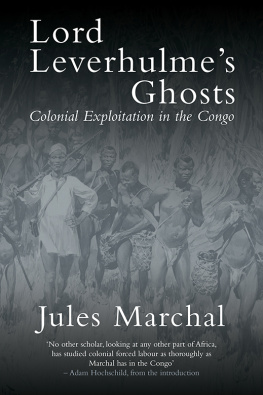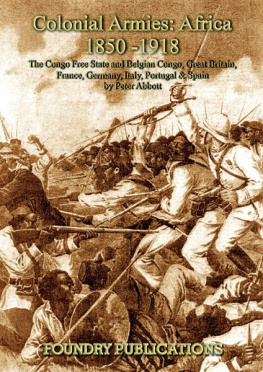The Black Man's Burden
African Modernization and Development Series
Paul Lovejoy, Series Editor
The Black Man's Burden: African Colonial Labor on the Congo and Ubangi Rivers, 1880-1900, William J. Samarin
Psychoses of Power: African Personal Dictatorships, Samuel Decalo
African Cities in Crisis: Managing Rapid Urban Growth, edited by Richard E. Stren and Rodney R. White
Patriarchy and Class: African Women in the Home and the Workforce, edited by Sharon B. Stichter and Jane L. Parpart
The Precarious Balance: State and Society in Africa , edited by Donald Rothchild and Naomi Chazan
African Population and Capitalism: Historical Perspectives, edited by Dennis D. Cordell and Joel W. Gregory
Southern African Labor Migration and the South African Gold Mines: 1960-1984, Jonathan Crush, Alan Jeeves, and David Yudelman
The Black Mans Burden
African Colonial Labor on the Congo and Ubangi Rivers, 18801900
William J. Samarin
First published 1989 by Westview Press, Inc.
Published 2019 by Routledge
52 Vanderbilt Avenue, New York, NY 10017
2 Park Square, Milton Park, Abingdon, Oxon OX14 4RN
Routledge is an imprint of the Taylor & Francis Group, an informa business
Copyright 1989 Taylor & Francis
All rights reserved. No part of this book may be reprinted or reproduced or utilised in any form or by any electronic, mechanical, or other means, now known or hereafter invented, including photocopying and recording, or in any information storage or retrieval system, without permission in writing from the publishers.
Notice:
Product or corporate names may be trademarks or registered trademarks, and are used only for identification and explanation without intent to infringe.
Library of Congress Cataloging-in-Publication Data
Samarin, William J.
The Black mans burden: African colonial labor on the Congo and
Ubangi rivers, 18801900/William J. Samarin.
p. cm. (African modernization and development series)
Bibliography: p.
Includes index.
ISBN 0-8133-7740-4
1. Working classAfrica, CentralHistory19th century.
2. SlaveryAfrica, CentralHistory19th century. 3. Indigenous
laborHistory19th century. I. Title. II. Series.
HD8809.S26 1989
305.5'67'096709034dc20 89-34722
CIP
ISBN 13:978-0-367-29038-2 (hbk)
Research over a period of eighteen years that led to the writing of this book was financially assisted by a number of agencies and institutions. At the University of Toronto, aid came from the Social Sciences and Humanities Research Committee and the International Studies Program. The Social Sciences and Humanities Research Council of Canada made possible a faculty research leave (1979-1980); it also contributed funds to research costs and made possible two trips to France. Help came as well from the Social Science Research Council (New York) and the Centre National de la Recherche Scientifique of France (CNRS), the latter for 1984 and 1988. Without their help this work would not have been possible.
Archives and private libraries were used in a number of places, where the personnel were most helpful in facilitating my work: the Academic des Sciences d'Outre-Mer, Paris; the American Baptist Historical Society, Rochester, New York; the Baptist Missionary Society, London, England; the British and Foreign Bible Society, London (now Cambridge); the Museum of Man, London; the Koninklijk Museum voor Midden-Afrika (Muse Royal de l'Afrique Centrale), Tervuren, Belgium; Archives Africaines, Ministre des Affaires trangres du Commerce Extrieur et de la Coopration au Dveloppement, Brussels; Abbaye Saint-Andr, Brugge; Algemeen Rijksarchief, Amsterdam; Archives Nationales, Section Outre-Mer, Paris, Aix-en-Provence; Congrgation du Saint-Esprit, Chevilly-Larue (formerly Paris); and the Centre de Documentation des Oeuvres Pontificales Missionaires, Lyon.
Help of a personal nature came from friends and colleagues on numerous occasions. At the risk of omitting some who should be listed here, I am happy to acknowledge the following: Kim Cone, Antoine and Louise Depeyre, Anne-Claude de Mazires, Marcel Diki-Kidiri, Luc Bouquiaux, Pierre Alexandre, Ian and Zosia Russell, Louise Polak, Fr. Alexandre Gills de Plichy, Fr. Bernard Nol, Fr. Ghislain de Banville, and David and Sheila Christie-Murray.
The whole or parts of this book were read in earlier versions by the following: Fr. Franois Bontinck, Dennis D. Cordell, George Egerton, Johannes Fabian, Henry Alan Gleason, Jr., Robert Harms, Fr. Gustave Hulstaert, and Martin A. Klein. Their help improved the book in many ways, but they cannot be held responsible for the faults that it may still have.
For more than thirty years I have lived, travelled, or done research in different parts of Africa, and 1 remember all these occasions with great fondness. The best years of my life were spent in the Central African Republic. That experience made an Africanist of me. More than that: It made a different person of me. I am grateful to all those who have enriched my life.
William J. Samarin
H. M. Stanley grandiloquently described the founding of the Congo Free State in the 1880s as a human experiment. He did not have in mind the agents of the experimentationthe whites whose financial investment and technological expertise were going to make something of central Africa. (The geographical area is characterized below.) He had in mind the material on which the experimentation was going to be conductedthe blacks who inhabited the forests and plains of this unknown and unexploited land.
Whites already knew what they could accomplish with all their expertise. Were they not transforming Europe and the Americas with the tools of industrialization and the benefits of science? It was known what whites could do with whites. They could be taught to use machines to produce more and better things. It mattered little that the workers were uneducated and even illiterate to begin with. They could be made into disciplined and productive factory workers. Farmers also, using new machines, could produce more. All these workers arrived at a better life for themselves, the bourgeois believed, and contributed to the improvement of the human race. Economic development was part of the process of advance in human evolution, and whites were doing their share.
Here was Africa now, untilled, unmined, undevelopedyet another part of the world that would demonstrate what human industry and intelligence could accomplish. It needed only one thingthe cooperation on the part of the inhabitants.
This is what we find implicit in Stanley's own words. The primary interest of whites was for "the human communities, the muscles of whose members have a more immediate and practical value to us. For without these, the flowers, the plants, the gums, the moss, and the dye weeds of the tropical world must ever remain worthless to them and to ourselves" (Stanley 1885(2):93). Africa's people were to provide the muscle for all that the whites were to set about doing. The list of products he gave in this context by no means reflects the reality of the exploitation he contemplated. He had had extensive familiarity with colonization. He knew personally what colonized people were called upon to do. He had himself already planted many stations in Africa. He had extracted from Africans, by the whip of words if not by the lash, thousands of hours of labor. He had pushed them to physical exhaustion. He had seen them die from shortage of food and illness. He knew already that vegetable products were not the principal ones that were going to be exported. Ivory was, to begin with, the most important commodity. But his list does give the idea of economic exploitation. It suggests to his readers that Africa's wealth was in its raw products. And it implies that the autochthonous peoples would be the ones who would provide whites with them.

